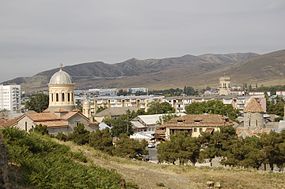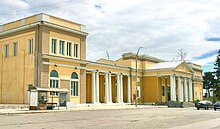Gori
|
Gori გორი |
|||
|
|||
| State : |
|
||
| Region : | Inner Cartlia | ||
| Municipality : | Gori | ||
| Coordinates : | 41 ° 58 ′ N , 44 ° 6 ′ E | ||
| Height : | 588 m. ü. M. | ||
| Area : | 16.9 km² | ||
| Residents : | 48,143 (2014) | ||
| Population density : | 2,849 inhabitants per km² | ||
| Time zone : | Georgian Time (UTC + 4) | ||
| Telephone code : | (+995) 370 | ||
| Postal code : | 1400 | ||
| Community type: | city | ||
| Website : | |||
|
|
|||
Gori ( Georgian გორი ) is the capital of the Inner Kartlien region in central Georgia .
geography
Gori is located northwest of Tbilisi at the confluence of the Kura and the Great Liachwi . The city has 48,143 inhabitants (2014). It is an administrative, industrial and cultural center in an extensive agricultural area.
The climate in Gori is temperate. The average annual temperature is 11 ° C, and the average annual rainfall is 585 mm.
history
The name of the city comes from the fortress Goris-Ziche ("fortress on the hill"), which has been preserved to this day and was known under the name Tontio in Georgian documents since the 7th century. Archaeological research found that under the medieval fortress there are remains of an even older fortification that was built in the 3rd to 2nd century BC. Were created. During the reign of King David IV the Builder , the city grew and strengthened. Since then it has been one of the most important in Georgia.
In 1818 one of the first theological colleges in Georgia was founded in Gori. 1872 she was awarded with the railway line Poti-Baku following the railway . In 1920 the city was destroyed by a strong earthquake. The town hall was built by German prisoners of war from World War II and is popularly known as the Reichstag because of its dome .
The city is only about 25 km from South Ossetia and on the strategically important east-west trunk road S1. From August 9 to 12, 2008, in connection with the Georgian-Russian conflict over this area, it was the target of Russian air strikes , which also claimed casualties among civilians. According to the human rights organization Human Rights Watch , 11 civilians were killed and dozens injured by Russian cluster bombs in Gori. Later, Russian troops moved into the city and occupied it, which was initially denied by the Russian army leadership, but was later confirmed. The media described the nature and extent of the destruction of the city as a result of the war in very different ways. UNOSAT has documented 33 destroyed houses.
Economy and Transport
The main employers in the city are the cotton industry and apparatus engineering. In addition, vegetables and fruits are processed.
In 2010 the trolleybus operation in Gori was shut down.
Culture
Cultural institutions are the Eristawi State Theater , founded in 1856 , a cultural center with two folklore ensembles , a pantomime ensemble and a children's theater ensemble, a historical-ethnographic museum and the nationally known Josef Stalin Museum , which glorifies Stalin.
Gori is a diocese of the Georgian Orthodox Church . The city's former Roman Catholic church now serves as the cathedral.
education
In 2007 the Gori State Pedagogical University was established. There is also an art and music college.
Attractions
Near Gori are the ruins of the Ksanis-Ziche fortress built in the 16th century to protect against the Turkish attacks , the old Georgian military road that connects the North Caucasus with Tbilisi , the Atheni-Sioni Church (7th century) and the cave village of Uplistsiche ( 6th century BC), which was a trading post on the Silk Road .
Town twinning
Gori has two city partnerships with:
| city | country | since |
|---|---|---|
|
Lod |
|
1996 |
|
Lutsk |
|
2008 |
sons and daughters of the town
- Alexander Khachanashvili (1866–1912), historian, philologist and university professor
- Giorgi Kandelaki (* 1974), boxer
- Koba Kurtanidze (1964-2005), Soviet judoka
- Merab Mamardashvili (1930–1990), philosopher
- Aleksi Matschawariani (1913–1995), composer
- Eduard Mirsojan (1921–2012), Armenian composer
- Alexander Nadiradse (1914–1987), Soviet rocket engineer
- Josef Stalin (1878–1953), Soviet politician and dictator. Gori is his native city. The house in which he was born and lived until 1883 is part of a museum. In 2010, the Georgian Minister of Culture, Nuka Rurua, announced that the museum in Stalin's birthplace would no longer serve to glorify him. A 17-meter-high Stalin monument has stood in front of the town hall since 1952 and was demolished in June 2010. Since then there have been hesitant plans to re-erect the Stalin monument in front of the museum on a low pedestal.
- Wascha Tarchnischwili (* 1971), football player
- Sulchan Zinzadse (1925–1991), composer
See also
Web links
- Preliminary Technical File. Gori, Georgia. (PDF) Kyiv Initiative Regional Program. Pilot Project on the Rehabilitation of Cultural Heritage in Historic Towns, around 2012
Individual evidence
- ↑ Georgia: Russian Cluster Bombs Kill Civilians HRW , August 16, 2008
- ↑ phw / dpa / AP / AFP / Reuters: Two-front war pushes Georgia on the defensive. Spiegel Online , August 12, 2008
- ↑ Map: Overview of Satellite Damage Assessment for Gori . ( Page no longer available , search in web archives ) Info: The link was automatically marked as defective. Please check the link according to the instructions and then remove this notice. (PDF; 4.04 MB) UNOSAT , August 28, 2008
- ↑ შეხვედრა ისრაელის ქალაქ ლოდის წარმომადგენლებთან. (No longer available online.) Archived from the original on April 20, 2018 ; accessed on April 20, 2018 . Info: The archive link was inserted automatically and has not yet been checked. Please check the original and archive link according to the instructions and then remove this notice.
- ↑ Gori ǀ Стара версія сайту Луцької міської ради. Retrieved April 20, 2018 .
- ↑ Stalin's hometown banished the dictator's monument. Spiegel online, June 25, 2010.
- ↑ Friedrich Zimmermann: Georgia: Daily greetings from the dictator. In: zeit.de. September 25, 2013, accessed December 2, 2014 .






